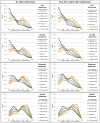Do scientific advancements lean on the shoulders of giants? A bibliometric investigation of the Ortega hypothesis
- PMID: 20967252
- PMCID: PMC2954151
- DOI: 10.1371/journal.pone.0013327
Do scientific advancements lean on the shoulders of giants? A bibliometric investigation of the Ortega hypothesis
Abstract
Background: In contrast to Newton's well-known aphorism that he had been able "to see further only by standing on the shoulders of giants," one attributes to the Spanish philosopher Ortega y Gasset the hypothesis saying that top-level research cannot be successful without a mass of medium researchers on which the top rests comparable to an iceberg.
Methodology/principal findings: The Ortega hypothesis predicts that highly-cited papers and medium-cited (or lowly-cited) papers would equally refer to papers with a medium impact. The Newton hypothesis would be supported if the top-level research more frequently cites previously highly-cited work than that medium-level research cites highly-cited work. Our analysis is based on (i) all articles and proceedings papers which were published in 2003 in the life sciences, health sciences, physical sciences, and social sciences, and (ii) all articles and proceeding papers which were cited within these publications. The results show that highly-cited work in all scientific fields more frequently cites previously highly-cited papers than that medium-cited work cites highly-cited work.
Conclusions/significance: We demonstrate that papers contributing to the scientific progress in a field lean to a larger extent on previously important contributions than papers contributing little. These findings support the Newton hypothesis and call into question the Ortega hypothesis (given our usage of citation counts as a proxy for impact).
Conflict of interest statement
Figures

References
-
- Merton RK. New York, NY, USA: Free Press; 1965. On the shoulders of giants.
-
- Newton I. Letter to Robert Hooke (15 February 1676) 1686.
-
- Ortega y Gasset J. New York, NY, USA: W. W. Norton & Company; 1932. The revolt of the masses.
-
- Szava-Kovats E. The false ‘Ortega Hypothesis’: a literature science case study. Journal of Information Science. 2004;30:496–508.
-
- Turner SP, Chubin DE. Another appraisal of Ortega, Coles, and science policy - Ecclesiastes hypothesis. Social Science Information. 1976;15:657–662.
MeSH terms
LinkOut - more resources
Full Text Sources
Miscellaneous

